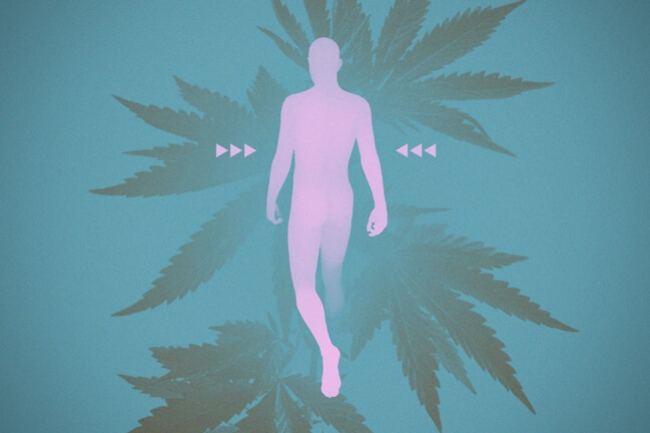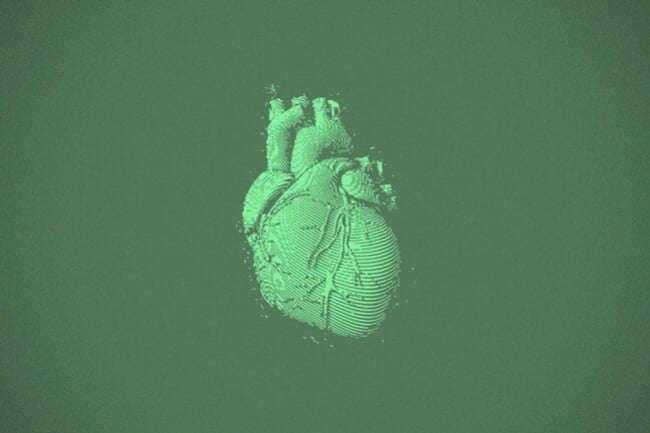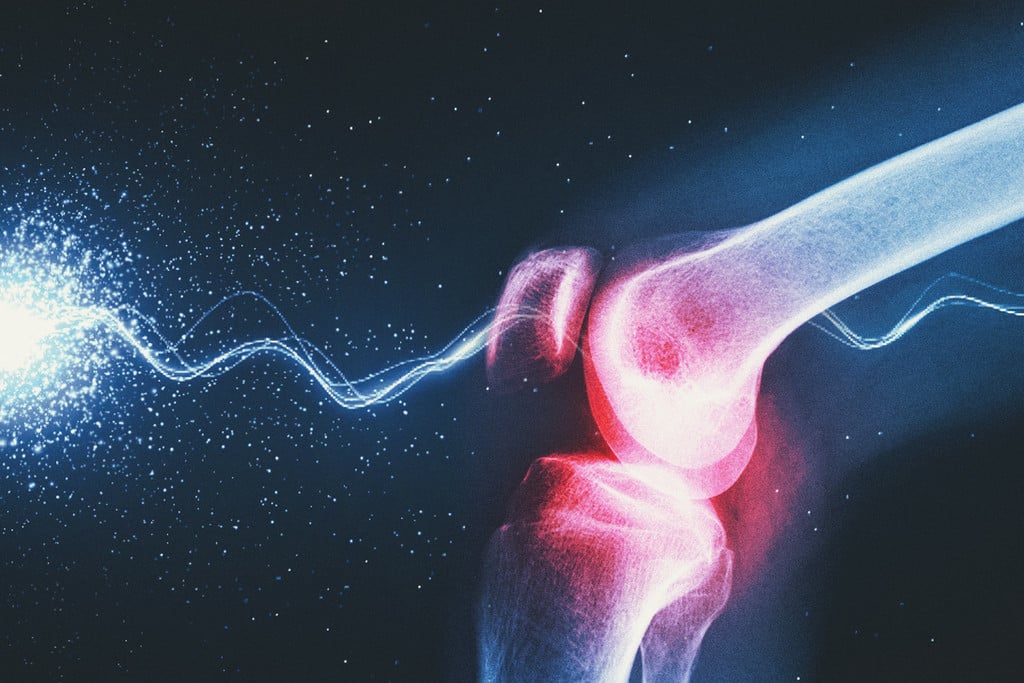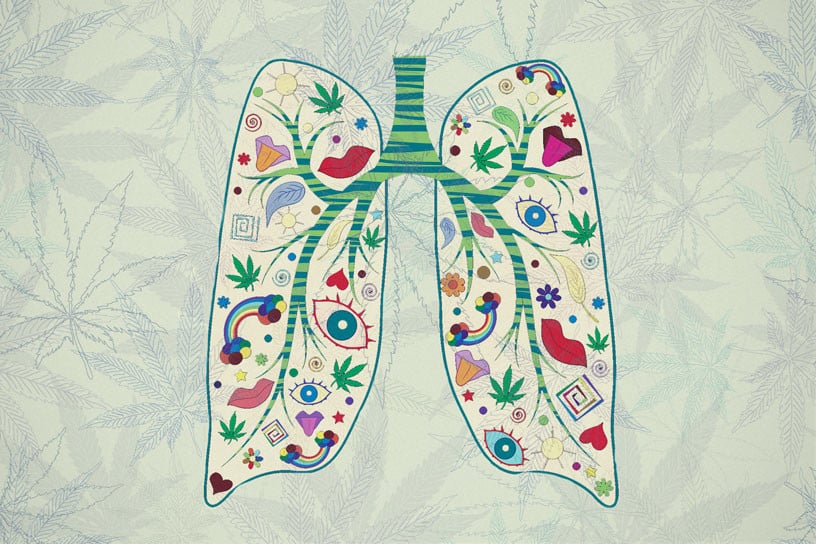.

How Do Cannabis, CBD, and THC Affect Hypertension?
Hypertension is a cardiovascular risk factor involved in diseases such as stroke and heart attack. Due to its high prevalence in the general population, it's important to know what it is and how best to mitigate the risk. What impact could cannabis have on hypertension? And should you partake? Read on to get a clearer understanding of the relationship between the two.
Contents:
In Europe, hypertension is involved in 42% of deaths.[1] This is a truly staggering number. As such, finding ways to reduce hypertension is critical to lowering this death rate and improving the quality of life of hundreds of millions of people.
Nothing beats a generally healthy lifestyle, but there are substances that can support this, and those that can negatively impact it. Regarding hypertension, what role might cannabis play? Can it help, or does it hurt? Before we examine the relationship between marijuana and blood pressure, let's review the basics of hypertension.
What Is Hypertension?
Hypertension is more commonly known as high blood pressure. Blood pressure is the force at which the heart, arteries, and veins must exert to constantly distribute blood around the body. The more resistance in the circulatory system, the higher the blood pressure required. Hypertension is a leading risk factor in a number of potentially fatal illnesses, such as heart failure, heart attack, stroke, kidney insufficiency, and more.
Essentially, hypertension, as a cause or as a consequence, ends up inflicting damage on both the heart and arteries. Primary, or essential, hypertension is mainly caused by arterial loss of elasticity. This increase in blood vessel resistance can cause damage to the heart by requiring it to pump harder all the time. As the years wear on and the arteries form a resistance buckle, the excess pressure exerted on the already stiff arterial walls can cause more issues with the blood vessels and other organs.
There also exists a rarer cause of hypertension, called secondary hypertension. This increase of blood pressure can be explained by the failure of other organs. Secondary hypertension can be caused by valvular heart diseases, endocrinology problems, or kidney conditions.
As noted, many Europeans die as a consequence of essential hypertension, and in the US, one-third of the adult population suffers from it.[2] So it is by no means a minor concern. There are many different treatments for hypertension, though the first port of call is generally to establish a healthier diet and exercise more. If the problem persists, an arsenal of medications, adjusted to each patient, can be incorporated. Any alternative to common drugs—though paramount to tackling this health problem and cannot be replaced—is worth considering. For example, what, if any, supporting role cannabis and individual cannabinoids may be able to play is worthy of exploring.
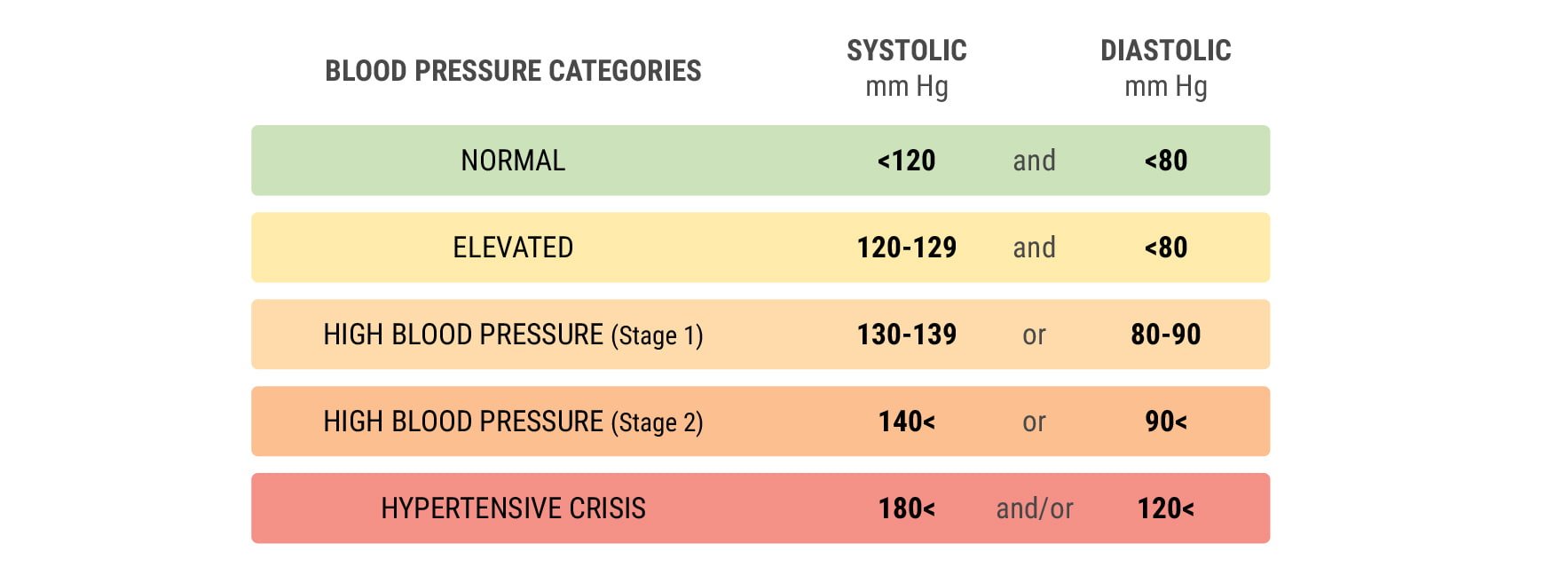
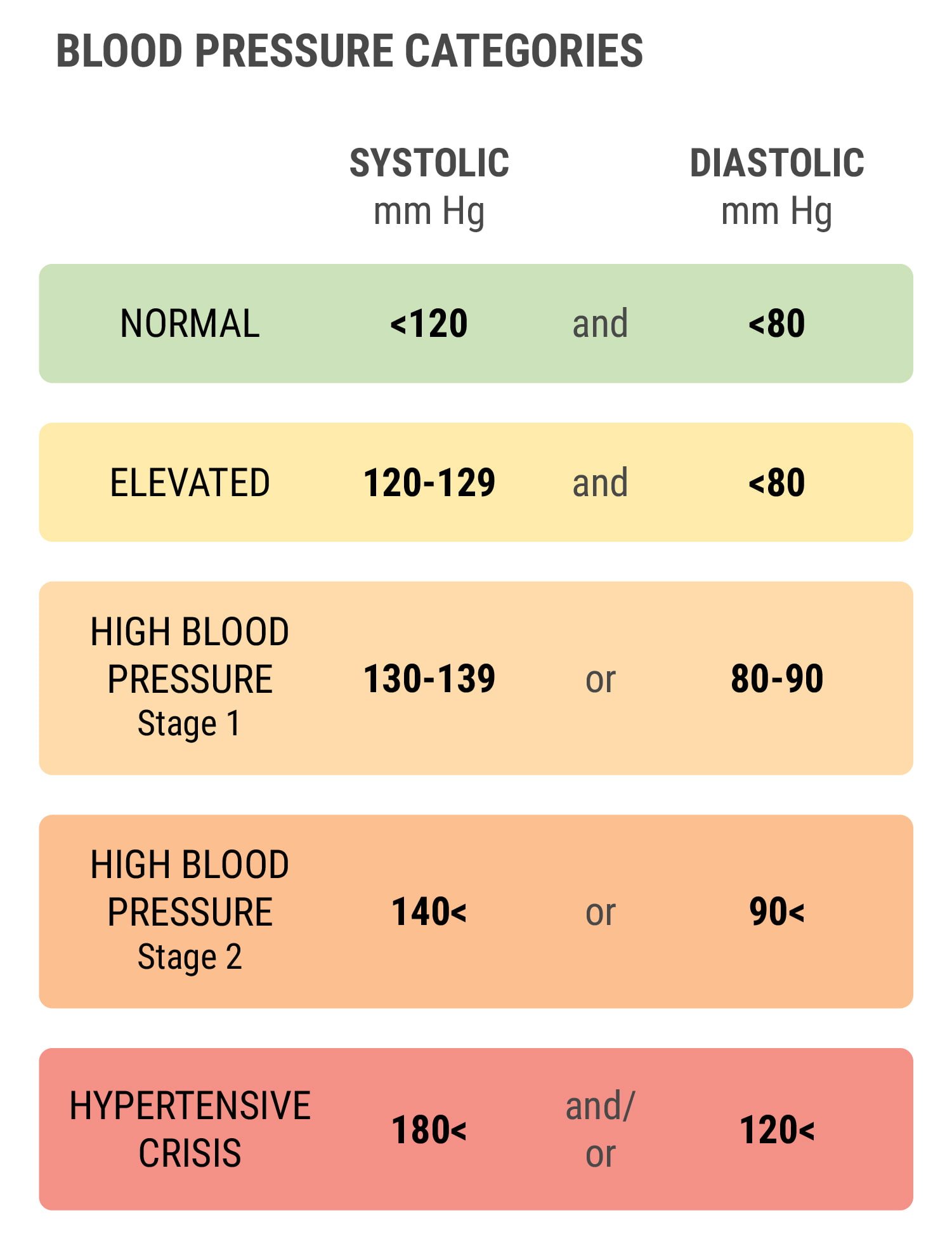
Are Hypertension and High Blood Pressure the Same?
Usually, both terms are used as a synonym for essential hypertension. However, hypertension and high blood pressure are not strictly the same concept. Both require a blood pressure of 140/3.5 inchesHg or more, so when does high blood pressure become hypertension?
From time to time, we all have high blood pressure. Whether we’re exercising, stressed, or unwell, there are many instances when blood pressure will go up without it being dangerous. Hypertension, then, is when blood pressure remains higher than this for prolonged periods of time, even when a person is at rest. In other words, it is a chronic case of high blood pressure.
What Are the Risks of High Blood Pressure?
As hypertension affects the heart and arteries, its dangers stem from damage and failure to these systems. Unfortunately, the heart and blood vessels are no minor organs, and if they become damaged, it’s bad news.
Risks of hypertension include:
| Heart disease | Heart attack | Stroke | Headache |
| Peripheral arterial disease | Retinopathy | Kidney disease | Vascular dementia |
| Heart disease | Heart attack |
| Stroke | Headache |
| Peripheral arterial disease | Retinopathy |
| Kidney disease | Vascular dementia |
How Does Cannabis Affect Hypertension?
So, how does cannabis affect hypertension? Researchers are currently looking to determine if, under certain conditions, cannabis may be able to lower blood pressure. However, many factors determine the effects of cannabis, so there are manifold elements to consider.
First, it’s important to understand a little about how cannabis interacts with the human body. The cannabinoids found within the plant chiefly interface with our endocannabinoid system (ECS). The ECS is a network of receptors, neurotransmitters, and enzymes that spans the length and breadth of the body, and appears to affect many physical and mental states.[3]
It is too broad a system to make generalisations, and not yet fully understood. Nevertheless, for the purposes of this article, be aware that, along with its other functions, the ECS seems to play a role in managing the cardiovascular system.[4]
Short-Term Impact of Cannabis on Hypertension
In a study, hypertensive cats were injected with THC and observed to display a reduction in blood pressure.[5] However, while this may demonstrate that under certain conditions THC can be associated with blood pressure reduction, those with chronically high blood pressure shouldn’t reach for the bong just yet.
Perhaps most importantly, the aforementioned rat subjects were injected with isolated THC, whereas most cannabis users smoke or vape their weed. Not only are a host of other compounds ingested alongside THC with these methods, but they come with their own health risks too.
On the flip side, it has been observed that in occasional cannabis users, blood pressure actually increases immediately after ingestion.[6] However, this effect seems to disappear, and even reverse, in those who use cannabis regularly. Exactly why this happens is unclear, including whether other factors, such as tobacco, are at play.
For instance, in occasional users who smoke spliffs, but otherwise don’t smoke tobacco, the nicotine (which is a stimulant) will have a powerful effect on the cardiovascular system.
Another study also supports the view that, in the short term, using cannabis may increase blood pressure. It found that in a significant number of users, systolic blood pressure rose moderately after cannabis consumption. No effect was observed regarding diastolic blood pressure.[7]
On the contrary, a third study performed on humans sought to determine if cannabis may, in the short term, reduce hypertension. Researchers noted that in people aged over 60, hypertension eased in the hours following cannabis consumption. Reductions were most prevalent after 3 hours, and at night.[8] They theorise that it could be the drug itself causing this, or indirect factors such as pain relief and stress relief—the inverse of either can cause a rise in blood pressure.
The effects on blood pressure in short-term cannabis users are still controversial, but it looks as though more data supports that some promising plant compounds—especially the cannabinoid CBD (see below )—are more prone to lower arterial pressure when administered in isolation. What we know is that cannabis has acute vasodilatory effects, which means it causes enlargement of the blood vessels. For those wondering, this is why stoners get red eyes. Larger blood vessels generate low pressure, which requires a greater beat frequency to push the same blood through them. This could partially explain some of the cardiologic effects—i.e. palpitations—that you may feel if you consume the herb.
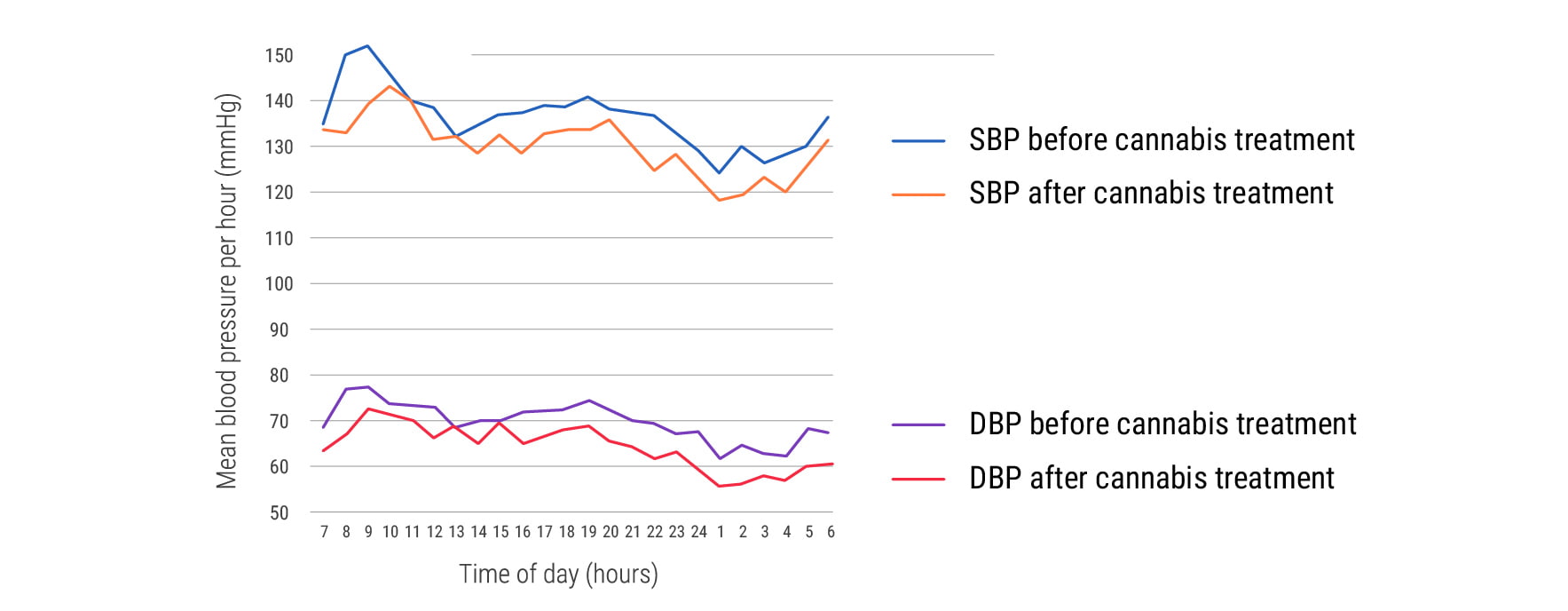
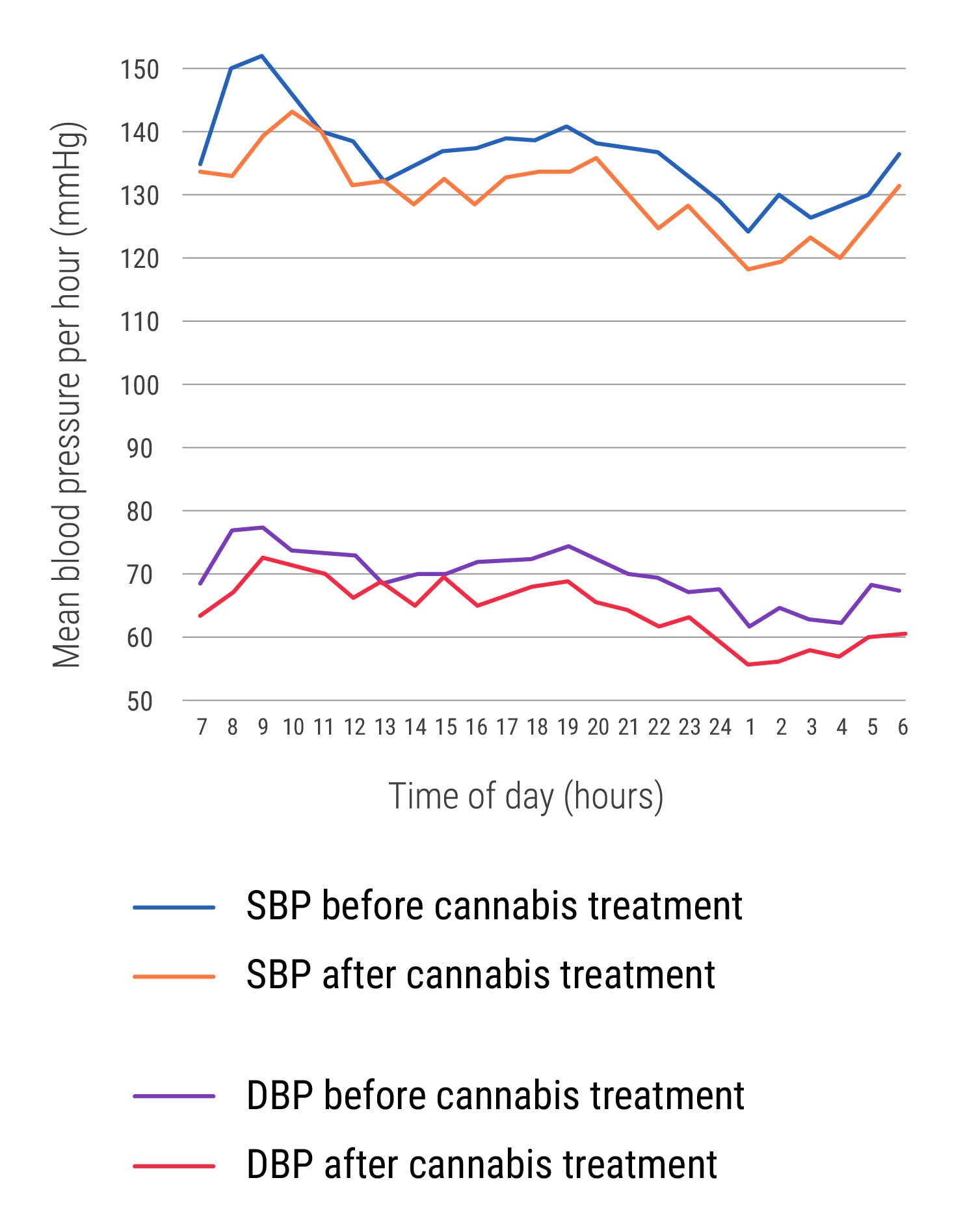
Long-Term Impact of Cannabis on Hypertension
There are few proper longitudinal studies on weed and blood pressure, or hypertension specifically, and of those that exist, they fail to properly isolate cannabis use from other factors. For instance, regular cannabis users are more likely to be regular tobacco users, and tobacco is terrible for hypertension and cardiovascular disease.
An article by Harvard found that in a study involving 1,213 people, and spanning many years, those who reported cannabis use were at a greater risk of death from hypertension and heart disease compared to those who didn’t use.[9] Although, they admit that accounting for other factors was near impossible.
Moreover, a cannabis “user” was anyone who admitted smoking cannabis at least once. So it makes no distinction between those who smoked cannabis all day everyday, and those who had a toke on a spliff in 2005.
A 2019 study concluded that the “effects of marijuana on the CV [cardiovascular] system are extremely worrisome”.[10] It identified many different negative effects on the CV system due to cannabis use.
A study from 2002 indicates that the effects of cannabis on blood pressure may differ between animals and humans.[11] It notes that while weed use shows a disparity in the results on blood pressure in humans, in some other animals, it appears to cause hypotension (a reduction in blood pressure).
These results are in line with the abovementioned study in which hypertensive cats injected with THC experienced reduced blood pressure. Unfortunately, it is too early to indicate that these findings can or cannot be applied to humans.
While the current evidence does not suggest that cannabis can be used to treat hypertension, there is still hope. First, most of these studies fail to properly isolate cannabis as a cause—so even if it doesn’t turn out that cannabis reduces blood pressure, it may be more neutral than things appear. Likewise, most of these studies look at cannabis as a whole, rather than isolating certain cannabinoids. So what about CBD?
Does Cannabis Lower Blood Pressure?
It’s unclear. However, given the findings we've discussed, we would advise those with hypertension to be extremely cautious before using cannabis. If the evidence points anywhere, it suggests that cannabis is more likely to exacerbate the problem, rather than improve it—and whether the herb is smoked alone or in combination with tobacco is a major factor as well.
A hypothetical situation in which this may differ is in instances where high blood pressure is caused by environmental factors, such as stress. That being said, this will depend on the individual and their reaction to cannabis.
Moreover, even if cannabis does work in this instance, it is dealing with a symptom and not a cause. If stress is causing chronically high blood pressure, you’re better off removing that stress from your life, rather than turning to cannabis.
CBD and Hypertension
But it’s not all bleak! While cannabis looks like it could increase blood pressure, isolated CBD is a different story. In a study on nine male volunteers, researchers attempted to determine if 600mg of CBD was capable of causing a reduction in blood pressure.[12]
Clearly this study is small and has many limitations. Nevertheless, it opens the door for further research into CBD’s effects on blood pressure—and hopefully the results will be positive.
The Future of Cannabinoid Treatments for Hypertension
Cannabis research is increasing at an incredible speed across the world, and with it there will undoubtedly be many wonderful discoveries. Exactly what role cannabis might play in hypertension remains to be seen.
So far, in the research surrounding marijuana and high blood pressure, studies have focused on THC and, more recently, CBD. However, as techniques improve, many of the other 113+ cannabinoids present in trace amounts in cannabis may be isolated and concentrated, and who knows what effects they’ll have!
- High blood pressure - country experiences and effective interventions utilized across the European Region https://www.euro.who.int
- Estimated Hypertension Prevalence, Treatment, and Control Among U.S. Adults | Million Hearts® https://millionhearts.hhs.gov
- An Introduction to the Endogenous Cannabinoid System - PubMed https://pubmed.ncbi.nlm.nih.gov
- Endocannabinoid system: An overview of its potential in current medical practice - PubMed https://pubmed.ncbi.nlm.nih.gov
- Role of the central autonomic nervous system in the hypotension and bradycardia induced by (-)-Δ9-trans-tetrahydrocannabinol | Journal of Pharmacy and Pharmacology | Oxford Academic https://academic.oup.com
- Cardiovascular pharmacology of cannabinoids - PubMed https://pubmed.ncbi.nlm.nih.gov
- Cannabis use and blood pressure levels: United States National Health and Nutrition Examination Survey, 2005-2012 - PubMed https://pubmed.ncbi.nlm.nih.gov
- Cannabis is associated with blood pressure reduction in older adults – A 24-hours ambulatory blood pressure monitoring study https://www.ejinme.com
- Marijuana linked to high blood pressure risk - Harvard Health https://www.health.harvard.edu
- The Cardiovascular Effects of Marijuana: Are the Potential Adverse Effects Worth the High? - PubMed https://pubmed.ncbi.nlm.nih.gov
- Cardiovascular system effects of marijuana - PubMed https://pubmed.ncbi.nlm.nih.gov
- A single dose of cannabidiol reduces blood pressure in healthy volunteers in a randomized crossover study - PubMed https://pubmed.ncbi.nlm.nih.gov


























